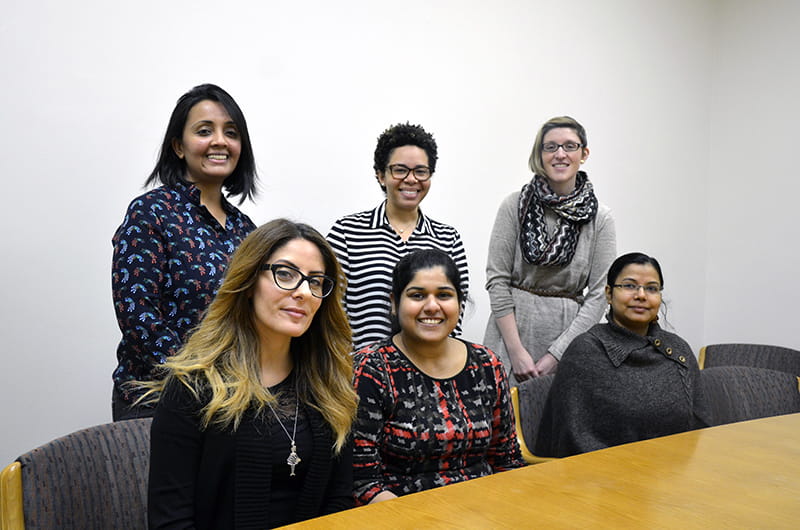The Secret Life of Postdocs, Vol. 3

This is the third and final installment in a series about why doctoral students at Drexel should consider postdocs and how to find the right opportunities.
Postdoctoral researchers are quite the anomaly when it comes to categorizing them within the Drexel University community. They’re not really students, but they’re also not faculty.
The fact that it’s hard to label them also leaves Drexel postdocs feeling like the places they have to turn for help are limited. That’s why several of them have come together to form the Drexel Postdoctoral Association (DPA). Current postdocs should keep an eye out for forthcoming information and events, and anyone considering a postdoc can seek the guidance of the DPA board. Here’s a little bit more about the board members and their goals for the organization:
Roshell Muir, PhD
Postdoctoral Fellow, Division of Infectious Diseases & HIV Medicine, College of Medicine
DPA Chair of Resource Development
Q: Why was the DPA formed, and what are your goals to unite and amplify the postdoctoral community at Drexel?
A: We are actually really excited to have started the DPA. It was started in around May of this year with Natalie Chernets, PhD, the director of Postdoctoral Affairs and Professional Development, having been newly hired. We all volunteered to be the founding board. I think we all had this thing where we all wanted to contribute somehow in bringing the community together. … I think the main drive in bringing us together was to not only support each other and come up with ways to gain access to tons more resources, but also form a sort of community where postdocs feel supported because we have a different niche. Faculty members have tons of committees and students have lots of different associations and so on. There really hasn't been that focus … but once we highlight the postdoc community more, we'll be able to advocate for many more things that will benefit us personally and professionally.
I’m also chair of resources, or resource development, and I’ve decided to tag membership onto it. The whole mantra of the resources committee is to provide support not only for the other DPA committees but to provide support and information to the wider postdoc community. So, I’ll firstly be working with Natalie to fix our home webpage under the Graduate College website. … I really want to promote the idea of just being a member of the DPA because we had a lot of people sign up during our National Postdoc Appreciation Week, which we hosted for the first time at Drexel in September. So we're definitely excited to reach out to them and set up membership meetings, get everyone involved and build some excitement among ourselves and hopefully that will spill over into the wider University.
Q: What do you wish current graduate students and doctoral students knew about postdoctoral positions?
A: I’ve been postdoc-ing for five years now. The advice that I got [before I started] was that postdoc-ing was good for honing your skills. I thought the PhD was training, but postdoc is also training.
I think postdoctoral training is key for being an independent researcher. … But I think it's really important that graduate students, not that they have to know what their end goal is, but if they know up front that they don't want a career-track or a tenured career-track, that they start in their last year looking into all the other things that they can do with a PhD. I kind of knew I didn't want a career in academia, but I don't think I did enough research after my PhD to investigate my other options other than being a postdoc. Honestly though, I actually have learned a ton during my postdoc years, so I haven’t felt like I made a mistake. However, I do feel like I could have done more research into what I could have done to help me get where we wanted to go quicker.
Mamta Shah, PhD
Postdoctoral Scholar, Games and Learning in Interactive Digital Environments (GLIDE) Lab, School of Education
DPA Chair of Funding Opportunities
Q: What do you like about having a postdoctoral position? Do you think there are any misconceptions about the positions in the Drexel community as well as like in the entire academic community?
A: I like being a postdoctoral scholar because I know it will prepare me for the career role that I have been working towards since I was a graduate student; that is, a tenure-track faculty position. I have used my postdoctoral training as an opportunity to work towards this future career role by building my research, teaching and service portfolio. In the social sciences, postdoctoral training is increasingly being recognized as a favorable experience before candidates choose to apply for a tenure-track faculty position. So, in these four years, I have engaged in training and cultivated the skills that I would need to succeed as a tenure-track faculty. As a postdoc, I’m buffered from a lot of the pressures that tenure-track faculty would have, but I’m still getting exposed to all the skills.
Q: What are your goals to unite and amplify the postdoctoral community at Drexel?
A: The committee that I'm chairing is the one on funding opportunities for postdoctoral scholars. Postdocs don’t always have necessary funding opportunities to be able to go to conferences and partake in professional development experiences. That could take a toll on their personal and professional wellbeing. So, I want to work towards making funding opportunities available for current and future postdocs. That way, postdocs can not only get funding for travel, but funding for some sort of professional development so they can network and increase their presence, explore different career opportunities and hone their skills towards targeted future roles.
Q: What do you wish current graduate students and doctoral students knew about postdoctoral positions?
A: Whether or not you're clear about whether you want to pursue a certain career pathway, use the postdoc opportunity to be very intentional. This is a nice buffer time to be in a second training phase after your graduation. …This is a nice time to carve your own niche and start getting recognized as somebody who has graduated from being a student to somebody who can be a colleague.
Q: If you would recommend a Drexel postdoc, what would you say?
A: Drexel is really at the forefront of being recognized as a competitive research university. As a member of the School of Education, I can say that postdocs will have an opportunity to engage in research supported by internal and external funding. They will also be encouraged to pursue their research interests. Overall, Drexel is a welcoming space. It's great even geographically because it's very accessible to big cities like Boston, D.C. and New York City.
Elena Irollo, PhD
Research Associate, Department of Pharmacology and Physiology, College of Medicine DPA Chair of Professional DevelopmentQ: What are your goals to unite and amplify the postdoctoral community at Drexel?
A: My committee is the committee of professional development because I think it’s one of the most important aspects for me since I do not really have a clear idea of what I want to do after my postdoc position. I’m not sure I want to become a principal investigator (PI), but I’m also not sure what I would like to do in industry, for example, since there are so many different things you can do. There are a lot of other postdocs in my position, so we’d like to do what we can to provide them with tools so they can be able to decide their career path.
Q: If you would recommend a Drexel postdoc, what would you say?
A: Drexel, I think, is a very great environment. … What Drexel provided me with is a great department that I can work in, and I chose Drexel because of my PI. I think Drexel is rich in great PIs and mentors. If it would have not been for Olimpia Meucci, MD, PhD, professor and chair of the Department of Pharmacoloogy & Physiology, I would not be here because I got several offers in different states and different cities. She’s an incredible woman and she is now my role model. I’m really honored to work with her.
Stephanie Matt, PhD
Postdoctoral Researcher, Department of Pharmacology and Physiology, College of Medicine
DPA Chair of Community-Building
Q: What are your goals to unite and amplify the postdoctoral community at Drexel?
A: I’m chair of the community-building committee. Mental wellness is really important to being a postdoc, and I think postdocs being social is a really important aspect. I think we forget that a lot of the times. So just establishing events where more postdocs can get together, do activities that they enjoy, find other people who have similar interests — I think that’s really important, especially if you’ve never lived in the Philadelphia area or the U.S. before.
We’re establishing a Blackboard community for postdocs as well, so that is going to just be a safe space for postdocs, whether or not they see an event they want to go to and post it to everyone else. Even if it’s something related to research, just establishing this community for everyone.
Q: If you would recommend a Drexel postdoc, what would you say?
A: I didn't really know what to expect coming to Drexel, but I was blown away with the pharmacology and physiology department. You walk into any lab and look for advice and there's so much collaboration going on. I was at a big university for my PhD and I did not get that same support, so I really appreciate that here.
Swathi Swaminathan, PhD
Postdoctoral Associate, Department of Mechanical Engineering and Mechanics, College of Engineering
DPA Chair of Wellness
Q: What are your goals to unite and amplify the postdoctoral community at Drexel?
A: I’m focusing on how to balance your emotional wellbeing, as well as physical wellbeing, in order to stay motivated and also maintain research integrity. This is an extremely stressful situation, honestly, and science and education basically just have this model of “publish or perish.” So if you have that going on, it’s going to foster a more and more stressful environment. Fortunately, all of us have really good PIs right now, so we are having a great time. It will give us the freedom to chose our path toward our next career level. But not everybody is going to have the same kind of mentorship position. So I would like to reach out to and kind of identify those postdocs and help them so that they can stay motivated during this process, and not get bogged down.
Ipsita Mohanty, PhD
Postdoctoral Fellow, Department of Pharmacology and Physiology, College of Medicine
DPA Board Member
Q: Why was the association formed, and what are you hoping to accomplish with the DPA?
I personally think a postdoc association is a must for every institution. I have known many colleagues, mostly international postdocs, facing a huge transition here, and they don't have any social life. They don't communicate much, they don't go to social gatherings very much. They think that their life is just this lab and in the pursuit of research, they keep sinking slowly into despondency. ... The DPA will work to facilitate their integration into the institution, which can improve their quality of life. It will also bring together different postdocs from different varieties, different fields and different phases of life.
Drexel News is produced by
University Marketing and Communications.

